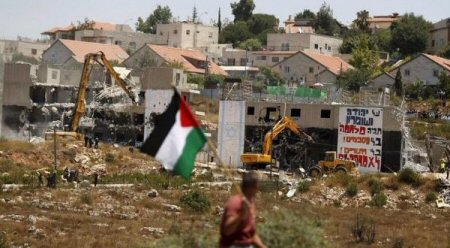Israel has recently stepped-up plans for building three new colonies in the Gush Etzion settlement block, south of the occupied West Bank city of Bethlehem, in direct coordination with the Gush Etzion Regional Council and the “Judean Hills Development Corporation.”
Israeli daily Maariv has reported that the Judean Hills Development Corporation, in coordination with the Gush Etzion Regional Council, are working with all relevant ministries to establish the three new settlements, on lands that are under the control of the Israeli military (in the occupied West Bank) “to solve housing crises around Jerusalem.”
The plans were also discussed with the former Israeli Defense Minister Moshe Ya’alon, who said he would help in evacuating the lands to enable the construction of 500 to 1000 units, in addition to building two new colonies.
One of the colonies would be built on lands that were reportedly “under Jewish control before the war in 1948, and were taken over by the Jordanian army,” while the other colony would be built in Gush Etzion bloc, which means a massive expansion, should the plans be officially approved by the Israeli government.
Israel’s colonies in the occupied West Bank, including in and around occupied East Jerusalem, are illegal under International Law and the Fourth Geneva Convention, to which Israel is a signatory and a constant violator.
Meanwhile, Israel continues strictly limit the Palestinians from living, building and developing their own lands in Area C of the occupied West Bank (%60 of the West Bank),
— B’Tselem: Even after the Oslo Accords, Israel retained full building and planning authority in Area C, which encompasses some 60% of the West Bank. Israel strictly limits Palestinian settlement, construction and development in this area, while ignoring the needs of the Palestinian population. This policy means Palestinian residents must subsist in very rudimentary living conditions.
They are denied any legal venue to build homes or develop their communities, so they face the constant fear that their homes might be demolished, and that they be expelled and lose their livelihood.
The Civil Administration prohibits Palestinian construction in vast areas of Area C, citing various rationales, such as defining these areas as state land, survey land, firing zones, nature reserves and natural parks, or by incorporating lands into the jurisdiction of settlements and regional councils.
In addition, the authorities prevent Palestinians from building even on lands that are enclosed between the Green Line and the Separation Barrier. After deducting for overlap among the various areas described above, Palestinians are prohibited from building on some 70% of Area C.
In the remaining 30% of Area C land on which constructions is not a priori prohibited, any construction must be pre-approved by the Civil Administration, be it for private homes, agricultural structures or infrastructure facilities.
The Civil Administration, however, imposes severe restrictions on such building. To date, the Civil Administration has avoided approving any master plan at all for over 90% of the villages located entirely within Area C, and has approved master plans for only 16 villages.
These plans, prepared without participation by local residents, fail to meet their needs. The boundaries set forth in these plans were determined according to the built-up areas of each village at the time of planning, thereby preventing expansion to meet population growth.
The limited building area these master plans designated excluded land around the villages available for development, and sometimes, even excluded existing structures on the villages’ outskirts.
The plans do not designate areas for public purposes such as schools or medical clinics and impose a high population density. The total area covered by these plans is currently only about one half of one percent of Area C. Read More (B’Tselem) Planning and construction policy for Palestinians in Area C

